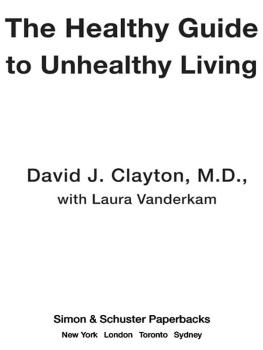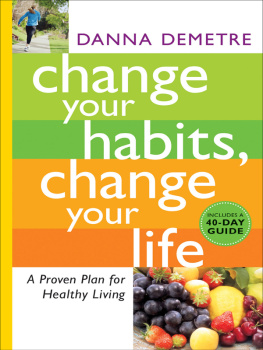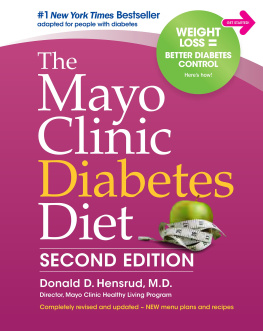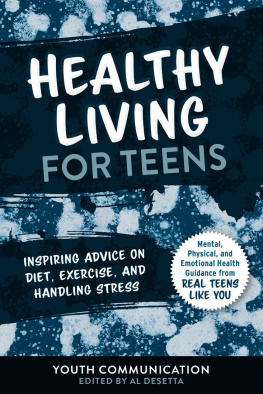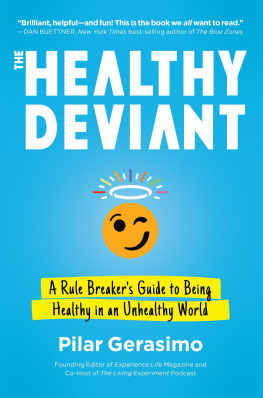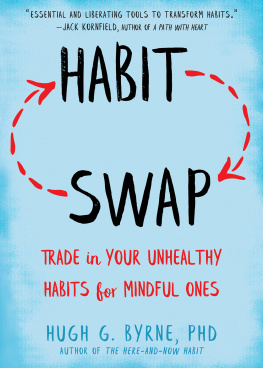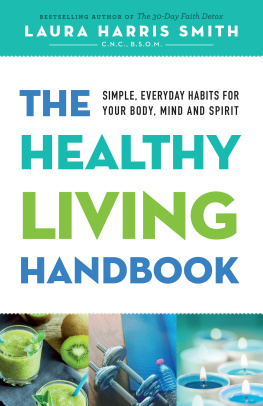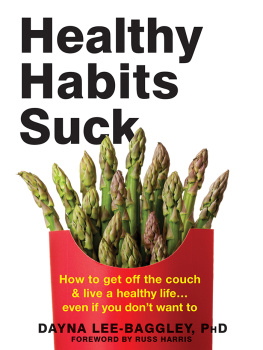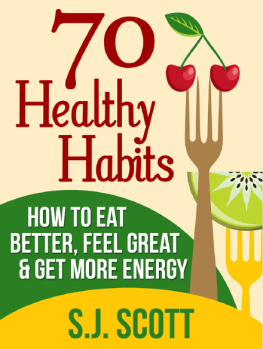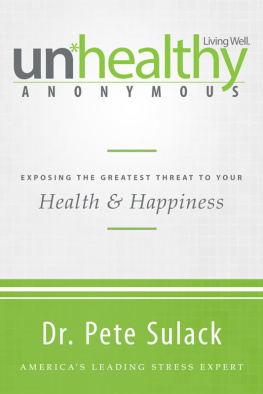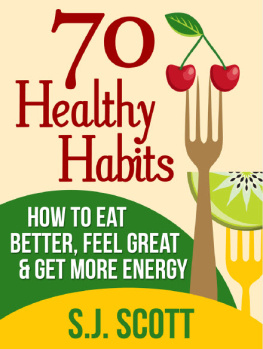The information and suggestions contained in this book cannot substitute for proper medical care. Consult your doctor or other health care provider before adopting the suggestions in this book. The authors and publisher disclaim any liability arising directly or indirectly from the use of this book.
SIMON & SCHUSTER PAPERBACKS and colophon are registered trademarks of Simon & Schuster, Inc.
Book design by Ellen R. Sasahara
Library of Congress Cataloging-in-Publication Data Clayton, David J.
The healthy guide to unhealthy living : [how to survive your bad habits] / David J. Clayton with Laura Vanderkam.
p. cm.
Includes index.
1. Health behaviorPopular works. 2. Self-care, HealthPopular works.
3. HealthPopular works. I. Vanderkam, Laura. II. Title.
Introduction
D ESPITE all the self-help books out there on living a healthy life, many of my patients dont want to know how to live a healthy lifethey want to know how to live their unhealthy lives better.
They dont want to stop drinking, smoking, doing drugs, or having casual sex with the other sleep-deprived professionals they meet at parties. They want to know how to do these things without killing themselves or permanently damaging their health. They want to know how to lose weight fast for a wedding, or whether a drug test will show last weeks joint. They want to know how to stay awake at the office when they havent slept well the night before.
I began mulling over a manual on bad habits when I moved to New York after finishing my residency in internal medicine in San Diego. In the hospital where I worked on the West Coast, most of my patients were over seventy. I learned a lot by helping them manage such problems as congestive heart failure, stroke, kidney and lung disease, but I also spent a lot of heart-wrenching hours trying to console the families of dying patients.
New York was completely different. After my residency, I headed to the Big Apple to study business at Columbia. I needed cash to put myself through school, so I landed a job at a medical clinic on the Upper East Side.
At this clinic, my patients were closer to age thirty than eighty. Virtually no one had a chronic disease, and the few who did were intelligent and motivated enough to partner with me in treating their illnesses. Most of my clients were professional bankers, lawyers, or consultants, and I even had a celebrity come through now and then. After earning my MBA, I started my own practice and kept seeing high-octane young professionals along with those just moving to New York ready to make their mark on the town.
The one thing that rich bankers and struggling actors have in common in New York, I discovered, is their desire to make the most of their lives. New Yorkers always want more than they have. Everyone is trying to make it here. To make it, people will push themselves beyond a sane, sensible existence. You dont have to be a doctor to know that eighteen-hour days in the office and happy hours that last until dawn wear on the body.
I call these young people the worried well. They suspect their habits are unhealthy, but they dont know what to do about them. I dont blame them for the confusion. Even with all the medical books out there, the Internet, and TV doctors galore, nonpreachy information on drugs or sexually transmitted diseases is hard to come by. The Internet just tells you that bump could be AIDS, or that burning could be chlamydia, herpes, gonorrhea, or ten other diseases, and next thing you know, youre a quivering mess. TV doctors tell you to stop screwing around and see your own doctor. When you get that appointment four itchy days later, hell say that you may have caught something, but the cultures wont come back from the lab for a week, and by the way, dont forget the copay at the door. As for good advice, dont expect much from your eight-minute visit beyond Dont do that again.
Many of my patients are pleasantly surprised to find that Im young (in my thirties) and that Im interested in hearing their worries about drugs, pregnancy, STDs, crash dieting, anxiety, stress, sexual performance, and other thorny issues. Unfortunately, these questions vexing people in my age group are not the ones I was trained to answer. Does Xanax take the edge off work-related stress? How bad is cocaine for you really ? Does weekend smoking cause cancer? These arent easy questions, but after much time spent poring over the medical literature, and after interviewing many top specialists, I was able to find the information my patients were searching for. This book is the result.
Some people will look at this advice and suggest that The Healthy Guide to Unhealthy Living will encourage bad habits, but I dont think thats the case. My patients will back me up on this: I tell them that they shouldnt make the unhealthy choices they make. But I also know that lectures saying Dont have sex and Dont drink too much are unlikely to register with people who think theyre invincible. I dont advocate illegal behavior, but I dont judge my patients if they admit to it in my office. My job as a doctor is not to impose my values on my patients, but rather to learn about their lives and their health and give them the information to make their ownhopefully intelligentchoices. If a patient tells me she drinks a lot and wants to mitigate the damage, but isnt ready to quit her weekend binges, Ill tell her what she can do. If she trusts that I have her best interests in mind, shes more likely to listen when I tell her that shes better off cutting back.
If you work a sensible, nonstressful nine-to-five job; if youre in a monogamous relationship; if you abstain from smoking, drugs, and alcohol; and if you are completely content in life, this book is not for you.
But if youve been known to drink, smoke, hook up, work too hard, or eat fast food for six meals in a row, this book will help you manage your bad habits, and may change the way you see your choices.
While you can follow many of my suggestions on your own, others require prescription drugs that are available only through consultation with a doctor. The last chapter of this book will help you navigate the medical system and figure out how to partner with your doctor to ensure the best care. While going to the doctor is never fun, the anxiety of worrying about your health is worse. If this book does nothing else, I hope to convince young professionals that even if you havent been a model patient when it comes to your health, you have nothing to lose from seeking help if you need it. Bad habits can be kicked, but its tough to do so on your own. None of the information in this book is meant to substitute for your own doctors advice, so always consult your primary physician if you have questions about your health.
A Note on Anonymity
Throughout the book, I use anecdotes to illustrate the lifestyles and medical problems that real people deal with. Many of my patients are high-profile individuals used to seeing their names in the newspapers, but like any patients, they are entitled to doctor-patient confidentiality. So while this books anecdotes are based on true stories, all the identifying details, including names, have been changed.

